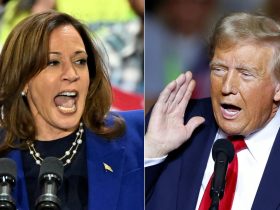Chancellor Rachel Reeves offers a speech on the Treasury on July 8, 2024 in London, England.
Pool | Getty Photographs Information | Getty Photographs
LONDON — Doubts are mounting over the Labour authorities’s flagship development and funding agenda, with one analyst warning additional tax rises may very well be coming as quickly as subsequent 12 months.
U.Ok. Finance Minister Rachel Reeves final week introduced a collection of reforms, together with monetary companies deregulation and measures to spice up pension investments — the newest in a slew of modifications geared toward getting the nation’s economic system rising once more.
The next financial development charge might theoretically increase the federal government’s tax take with out the necessity to increase taxes additional, as a result of general revenues can be greater. Labour has a wonderful steadiness to strike, nevertheless, in conserving taxes excessive sufficient to fund the nation’s depleted public companies, whereas leaving companies with sufficient money to speculate and develop.
“The Chancellor is strolling an actual tightrope with this one,” James Smith, economist at ING, advised CNBC’s “Squawk Field Europe” on Friday.
“These form of regulatory modifications – not simply in finance however in planning and different areas – if they do not get the economic system shifting, I believe we’re taking a look at extra tax rises once more,” he stated.

The Financial institution of England’s former deputy governor, John Grieve, expressed doubt final week that the measures would spur development, saying neither monetary companies deregulation nor pension reforms had been “sport changers.”
“I believe she [Reeves] goes to should do some larger issues to attempt to increase personal funding,” Gieve advised CNBC on Friday, citing planning and infrastructure initiatives as more likely to spice up the economic system.
The reforms got here simply over two weeks after Reeves’ bumper tax-and-spend funds, which included £40 billion ($51.8 billion) in tax hikes and modifications to the nation’s debt guidelines — measures Reeves stated had been important to rebalance the U.Ok.’s gaping deficit.
The impartial Workplace for Price range Duty stated on the time that the measures ought to drive the economic system within the near-term, and raised its financial development forecast by a number of proportion factors over the following two years, whereas decreasing it long run. The OBR now expects U.Ok. actual GDP development of 1.1% in 2024, adopted by enlargement of two% in 2025, earlier than falling to 1.5%.
Companies, nevertheless — which had been particularly onerous hit by a sweeping enhance within the Nationwide Insurance coverage payroll tax — stated Labour’s plans had been prone to curb hiring and discourage funding.
“The true threat for the chancellor — and for companies as nicely — is that we get extra of the identical subsequent 12 months on the subsequent funds if we do not see that response in development coming by,” ING’s Smith stated.
The Labour authorities didn’t instantly reply to CNBC’s request for touch upon additional attainable tax modifications.
‘Determined’ development charges
The U.Ok. economic system barely grew within the third quarter, eking out a less-than-expected 0.1% enlargement, knowledge from the Workplace for Nationwide Statistics confirmed Friday. Gross home product (GDP) fell by 0.1% in September, additionally under expectations and following development of 0.2% the earlier month
“That is determined development. We have had 1% development, or round 1% development now because the Monetary Disaster. That is 15 years. So it is a well-established development and we have to do one thing dramatic,” Gieve stated, commenting on the GDP knowledge.
The third quarter was a time of serious uncertainty within the U.Ok., with the federal government accused of speaking down the economic system and spooking traders forward of the Oct. 30 funds.

As such, some analysts argued the federal government’s fiscal plans, and development agenda extra usually, needs to be given extra time to mattress in.
“Measuring success within the very short-term dangers declaring the entire endeavour a failure earlier than there’s an opportunity for inexperienced shoots to achieve the floor,” Sarah Coles, head of private finance at Hargreaves Lansdown, advised CNBC through e mail Monday.
Paul Dales, chief U.Ok. economist at Capital Economics, stated the plans had been prone to be measured over the approaching months and years when it comes to how efficiently financial development holds up in opposition to the OBR forecasts — with any tax modifications then set to comply with go well with.
“If it [growth] is weaker and that weak point is predicted to be sustained, then it might imply taxes have to rise additional to attain forecasted ranges of tax income,” Dales stated over e mail, noting that Capital Economics forecasts a sight uptick in development. If there have been additional stress to lift authorities spending, whereas all else stayed unchanged, greater taxes may very well be anticipated, he added.
Markets will now be watching whether or not the federal government’s reforms can inject development into the flagging British economic system.
Nonetheless, Coles prompt that tax hikes — at the very least on the subsequent fiscal assertion in March — can be “extremely unlikely.”
“There’s all the time the possibility we may very well be hit by one thing out of the blue, which upends expectations, however in the meanwhile Labour has dedicated to 1 main Price range a 12 months, so something substantial sooner can be an actual shock — particularly after such a serious fiscal occasion in October,” Coles stated.
“The approaching months will give us a clearer image of whether or not the federal government has bought the steadiness proper.”







